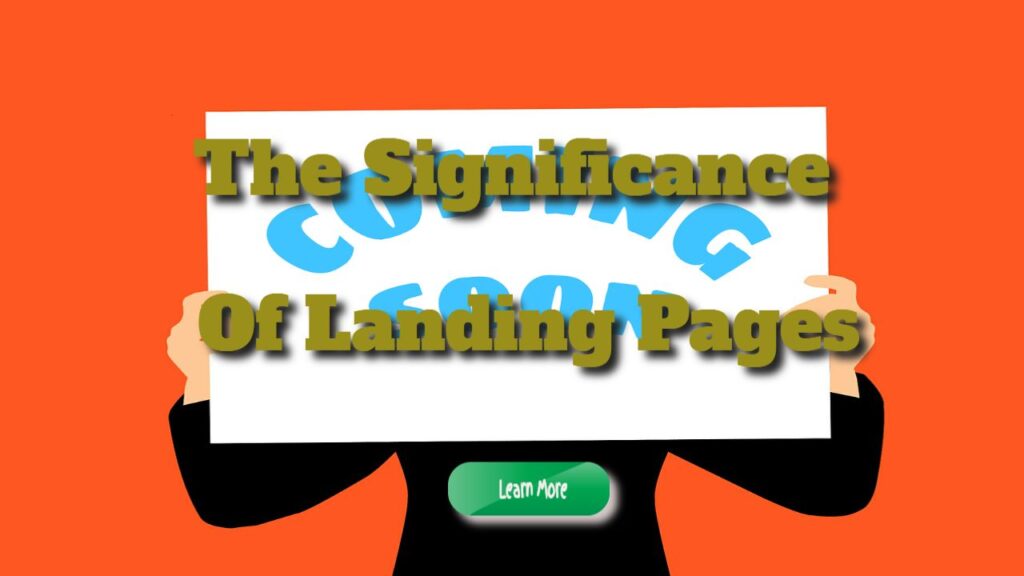The Significance of Landing Pages
The Significance of Landing Pages: What precisely are these pages people land on when they visit a website?
Landing pages are static pages that serve as the website’s front door. Customers typically “land” on these pages after clicking on an ad, marketing promotion, marketing email, or marketing action.
They are sometimes called “landing pages” or “lead acquisition pages.”
Why are landing pages used by marketers?
Landing pages enable marketers to convert leads by strategically putting call-to-action features such as links, forms, buttons, and other website elements.
Because a landing page is often the initial point of contact between a user and a business, marketers will improve it to increase the odds of conversion.
The following are many of the most persuasive arguments in favour of using landing pages:
A link between advertisements and brands
This indicates that the user’s first click on the ad does not correctly represent the brand’s personality and does not fully direct the consumer around the company website.
The ultimate goal is to sign up for a newsletter, buy a service or product, or engage in other conversion activities.
The text on your landing page must match the text on your ad or marketing material. This ensures that consumers a) are in the appropriate place and b) a consistent message elicits trust, which is especially crucial when targeting a cold audience.
The home page lacks specificity.
For those who are looking for a specific question. Because they have to go through the hassle of searching for what they want, users who land on a homepage are less likely to convert.
It’s far better to send them there through a landing page.
As a result, landing pages help assist conversion and lead the user deeper (as indicated above) to boost conversion chances.
Segmentation
A marketer may use audience segmentation to obtain ideal conversion rates if a brand offers a variety of products and services.
Marketers can segment based on target personas, behaviour, or demographic characteristics. Keeping this in mind, various consumers necessitate different methods of targeting.
Would you, for example, target an 80-year-old grandmother in the same way that you would a 25-year-old Millennial?
No, most likely. While the Millennial profile uses several internet platforms and speaks casually, the grandmother’s profile does not necessarily fit into the same cohort.
This is where landing pages may help. Different user routes are required for different portions of your target audience.
Assume you own a pasta company. To appeal to the grandma, your advertisement could say something like, “the tastiest chicken soup for your grandchild with our noodles!” The landing page may feature information about noodles.
How simple they are to use, how gentle they are on the stomach, and a CTA that says, “check out our chicken soup recipe.”
If the same pasta company wants to target 25-year-old millennials, the ad could read, “get your lunch on the go with our noodles.” The landing page could include information about said noodles, how easy they are to use, how ideal they are for people on the go, and a CTA that reads “flavours for every day of the week.”
The same company, but different audiences, as defined by the landing page. This shift in tone may boost your conversion rates.
More marketing
Because Google limits the character length for PPC advertising to 140 characters, a landing page allows you to expand on your pitch.
In this case, a landing page should explain why the user should convert (buy, sign up for the newsletter, or contact the company for more information).
Conversion types on landing pages
Landing pages can serve a variety of purposes, depending on the marketing methods employed by each firm.
Newsletter subscriptions
Details on a given subject
Download
Contact us through chat.
CTA for adding to the cart
An event registration
Who are landing pages intended for?
Here are some additional advantages to including landing pages in your marketing strategy:
Why are landing pages beneficial?
Landing pages are critical if you employ advertisements in your digital marketing plan. If you’re running ads, you should probably also create landing pages.
Budget Management
Increase your conversion rates while decreasing the cost of gaining a lead or transaction.
Your conversion rates will often rise because landing pages provide a strong case for the visitor to convert directly.
Specific – What the user desires, what they truly desire.
With a single click, you can give exactly what the user wants.
For instance, if you own a home goods store and your ad says, “Get 50% off home goods,” your landing page may say, “50% off all home items today only,” and include a product list.
Techniques for optimizing landing pages
Here’s how to ensure that your landing pages are adequately optimized, so your lead (aka user) does not bounce. Here are some of the landing page optimization tactics we employ at Forty8Creates:
Copy for advertisements
For better targeting and consistency, ensure ad language and headlines are close, if not the same.
In contrast to a fish out of water clicking around to figure out what they clicked on initially.
CTAs that are visible
Ensure that your CTAs are visible and appealing. This is accomplished by highlighting a button that stands out from the rest of the text.
Above-the-fold content
Above-the-fold is a word used frequently in web design.
This word refers to the first material displayed when a page loads. Above-the-fold content that quickly engages the user, such as hero photos or hero sliders with a call to action, is considered good.
Hero header, slider, and picture
Hero is, in essence, everything.
This is known as a hero header.
Focusing on these features is beneficial since it immediately captures and retains the visitor’s attention.
Directional cues in Design
The phrase “directional cues” refers to the website’s visual components that guide the user’s eyes through each page.
They are organized to draw attention to specific features such as CTA buttons, relevant information, or testimonials.
Usability and UX
Some solutions that allow you to construct landing pages already include instructions to assist you in creating the most functional and user-friendly page possible.
If your pages have a high bounce rate, try implementing a heatmap analytics tool to understand better how past users saw and used the site.
Focus
Because it does not overwhelm the user, a consistent, persuasive argument raises the odds of conversion.
After all, the user is solely concerned with what you are advertising. Anything else that isn’t what you advertised is meaningless.
Harmony and consistency
The goal of the entire page should be to get the user to convert; every element should serve that purpose on the page.
This element is primarily driven by the page’s Design, but remember that consistency in your voice and messaging is also beneficial here.
Social proof and testimonials
The best kind of marketing for any company is word of mouth. This is because it accurately demonstrates that your firm can deal with customers.
The closest thing to word-of-mouth you can get online is testimonials and social proof (reviews, comments, pictures of your product, etc.).
Make sure your landing page contains testimonials and social evidence. They are typically positioned towards the bottom of the page and serve as an additional reason for purchase without requiring you to write or say anything.
Conclusion/reinforcing statement
For example, you may explain why your items benefit the customer or how your services can improve the user’s life.
But try to limit your arguments, so the user doesn’t get too overwhelmed.
You’ve got this!
Despite these standards, each firm and each customer is unique.
Get out there, work on your landing pages, convert those users, and buy that sun-kissed house*.
The post The Significance of Landing Pages appeared first on https://gqcentral.co.uk

